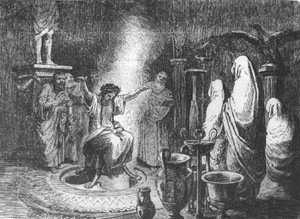Socrates and the Pythian Oracle

Socrates, so humble, wise and kind,
And eminent acclaimed philosopher,
Sparred with officials a with narrow mind,
While teaching in an open market square.
And was condemned as frivolous atheist,
For his extravagant forbidden views
whose bold conjectures were to be dismissed
As dangerous, perverting Athen’s youth.
He taught some weird religious novelties,
At odds with the prevalent deities,-
The verdict came from high authorities:
“Away with him - a dangerous man he is.”
“Away with him! - if not he will seduce
The students and the people listening
And with his propositions will confuse
The young, lo! - Athen’s youth, - an awful thing!”
“Condemn him then to drink the fatal brew,
The Comium from poison hemlock stalks,
The tenets are corrupted through and through,
Who does confuse the mind with dangerous talks.
Beware of him, hear good Athenians!
Let not your gods and deities befoul!
He does declare, "mongst other things that man
Has an immortal everlasting soul”
He’d met with poets and with bards to gain
In wisdom and in insight an increase,
But Oh! they gave him in the neck a pain,
And not new wisdom, nor the golden fleece.
He spoke :”the bards give airy nothingness
A place to dwell in, and give it a name, -
Elucidate they can’t and can’t express,
What’s all about - the poets can’t explain.
He’d asked the politicians and the bards,
The tragic, dithyrambic of all sorts,
But vague and so evasive were their words,
Their answers did not meet the norms of art.
Explain! explain! why! how! - this they can not,
No matter how you push them hard and press,
Their explanation is unclear and odd, -
Ah! bards and poets are ambiguous!
With wisdom poets never can effect
Their real subject, but they just sing out,
Their utterances fail to be exact,
And what their song is really all about.
One can not learn from poets anything-
Unstable, fickle like the butterflies,
That flutter restlessly on frenzied wings,
While striving for the ethereal skies.”
But an exception are the fully mad,
The maniacal mad, - are truly wise,
The Delphic Oracle for instance, clad

In veils and in her rapture prophesies.
But lo! this kind madness has to come
As gift, - inspired by Divinity,
If not, - the maniacs drift and rove and roam,
In lowest spirit realms mentally.
The poets that are sane must toil for truth,
And sweat and grind and labor long and hard,
Dragged like an infant by a kindly muse,-
The maniac is the veritable bard.
The maniac,- inspired, only he, -
Alone can probe the depth and lift the veil,-
Gratuitous gift of the divinity,-
While sane and normal poets flunk and fail.

Transfixed the Oracle sits by the caves,
Enunciating hoarsely prophesies,
The supplicants look trembling as she raves,
Or wails, seized by a cryptic entity.
Out of her mind, all reason and her wit,
As she declares or wails what god decreed,
Wild is the speech, she utters on her seat,
The Tripod, - and some priests interpret it.
“Hear! Socrates is Hellas wisest man!”-
She uttered in a god-inspired trance:-
“But I know naught the sage spoke, but I am
A fan that pays the goddess Wisdom reverence!".
The poets are bereft of reason when
They utter words and in enchantment sing,
They are possessed, possessed,- one never can
Begom wotj bards and poets reasoning.
Out of their mind, as any great rhapsode,-
Inflamed, inspired an interpreter,
Who acts his part,- obedient to some god,
And with the latter’s wishes must concur.
T’ has naught to do with art and knowledge then,-
A docile tool,- an instrument is he,
The bard or prophet, or inspired man,
When seized and roused by the divinity.
No art here and no knowledge - bards are prey-
Without a debate nor an argument
Inspired are the bards, they sing and say
What they themselves don’t even understand.
Of mind a certain trace of unsoundness,-
At least,- unstableness - to some degree,
Enchantment and an urge impetuous,
Are called for when creating poetry;
These and more solemn words spoke Socrates,
Before he lifted up the fatal bowl,
Such as: “Disciples hear!- do not fear death;
Divine a spark, - eternal is man‘s soul!.

Philosopher was Socrates, thus he
Could never boast of poetry nor muse,
But in his inquiries relentlessly
He probed and searched for one thing only - TRUTH.
The drink of death then took this wondrous man,
Whom Pythia’s Oracle had recognized,
As Grecian Phoenix, Eagle, Pelican,-
Greek forerunner and deputy of Christ.
© Elizabeth Dandy

Very profound piece. The bottom line is every one has perception and intention.It's individual and unique to the singly mind and not right or wrong but individual.What is norm is deemed by those running society at the time but then time is abstract,so therein answers the question of society and its perception- my take on this piece